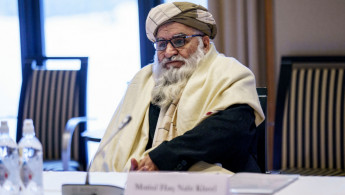Afghan women activists feel betrayed as Norway hosts Taliban
Afghan women protesting against the Taliban's harsh rule say they have been betrayed by Norway, the first Western nation to host the hardline Islamists since they seized power in August.
Led by their foreign minister, a Taliban delegation travelled first class on a plane specially chartered by the Norwegian government to Oslo for meetings with Western officials and members of Afghan civil society.
Women activists who have been facing intimidation by the Taliban after staging small and scattered protests are outraged by the diplomatic efforts.
"I am sorry for such a country as Norway for organising this summit, sitting with terrorists, and making deals," said Wahida Amiri, an activist who has protested regularly in Kabul since the Taliban's return.
"It saddens me a lot. Shame on the world for accepting this and opening doors to the Taliban," she told AFP.
Several women - too afraid to step outside - instead protested in their homes in the cities of Kabul, Bamiyan and Mazar-i-Sharif, in images posted to social media.
"Norway has invited criminals and terrorists who have no respect for women's rights and human rights," an activist from Bamiyan who asked not to be identified told AFP.
"They [the Taliban] are against women and humanity and they do not believe in freedom of speech."
Another activist in the city said women were concerned their rights would be "traded behind closed doors" in Oslo.
The Taliban have promised a softer rule than their last stint in power between 1996 and 2001 when women were banned from leaving the house without a male chaperone and forced to wear the all-covering burqa.
Many women, however, remain deeply mistrustful and afraid of the new government.
Women's rights improved slightly over the past 20 years in the deeply patriarchal nation, but the gains were mainly limited to cities.
Last week, women activists said two of their comrades, Tamana Zaryabi Paryani and Parwana Ibrahimkhel, were seized from their homes in Kabul after taking part in a demonstration.
The Taliban have denied any involvement.
Isolated from talks
Some Afghans argue that engaging with the Taliban is necessary to save the country from collapse, with millions suffering from hunger.
Afghanistan's humanitarian situation has deteriorated drastically since August when the Taliban stormed back to power 20 years after being toppled.
International aid came to a halt, worsening the plight of millions of people already hungry after several severe droughts.
No country has yet recognised the new government, and Norwegian Foreign Minister Anniken Huitfeldt stressed the talks would "not represent a legitimisation or recognition of the Taliban".
Afghanistan's new Taliban authorities warn they have the right to crack down on dissent and jail protestershttps://t.co/hljKy0EnQE
— The New Arab (@The_NewArab) January 23, 2022
During the first day of talks on Sunday - aimed at addressing the deepening humanitarian crisis - the Taliban met with Afghan civil society members, including women activists and journalists flown in from Kabul.
Women's rights campaigners took part in previous negotiations between the Taliban and the United States leading to a deal in Doha in 2020 that ultimately failed to stop the militants seizing control of Afghanistan.
Hoda Khamosh, a women's rights defender who was invited from Kabul to the Oslo talks, warned the West that by "remaining silent or tolerating the Taliban, you are partly responsible for these crimes".
Mahbouba Seraj, who also took part in the discussions, said she was "hopeful" and the Taliban had "acknowledged and heard us" during the talks.
But many feel isolated from the meeting, held in a high-end hilltop hotel.
"As a protester seeking the rights of women in Afghanistan, facing street fights with the Taliban in Kabul... [these women] cannot represent us in the Oslo summit," said one woman in a news clip posted to social media.





 Follow the Middle East's top stories in English at The New Arab on Google News
Follow the Middle East's top stories in English at The New Arab on Google News
![The UAE is widely suspected of arming the RSF militia [Getty]](/sites/default/files/styles/image_330x185/public/2024-11/GettyImages-472529908.jpg?h=69f2b9d0&itok=Yauw3YTG)
![Netanyahu furiously denounced the ICC [Getty]](/sites/default/files/styles/image_330x185/public/2024-11/GettyImages-2169352575.jpg?h=199d8c1f&itok=-vRiruf5)
![Both Hamas and the Palestinian Authority welcomed the ICC arrest warrants [Getty]](/sites/default/files/styles/image_330x185/public/2024-11/GettyImages-2178351173.jpg?h=199d8c1f&itok=TV858iVg)